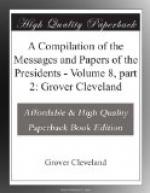John Quincy Adams.
Washington,
February 5, 1827
To the Senate and House of Representatives of the United States:
I submit to the consideration of Congress a letter from the agent of the United States with the Creek Indians, who invoke the protection of the Government of the United States in defense of the rights and territory secured to that nation by the treaty concluded at Washington, and ratified on the part of the United States on the 22d of April last.
The complaint set forth in this letter that surveyors from Georgia have been employed in surveying lands within the Indian Territory, as secured by that treaty, is authenticated by the information inofficially received from other quarters, and there is reason to believe that one or more of the surveyors have been arrested in their progress by the Indians. Their forbearance, and reliance upon the good faith of the United States, will, it is hoped, avert scenes of violence and blood which there is otherwise too much cause to apprehend will result from these proceedings.
By the fifth section of the act of Congress of the 30th of March, 1802, to regulate trade and intercourse with the Indian tribes and to preserve peace on the frontiers, it is provided that if any citizen of or other person resident in the United States shall make a settlement on any lands belonging or secured or granted by treaty with the United States to any Indian tribe, or shall survey, or attempt to survey, such lands, or designate any of the boundaries by marking trees or otherwise, such offender shall forfeit a sum not exceeding $1,000 and suffer imprisonment not exceeding twelve months.
By the sixteenth and seventeenth sections of the same statute two distinct processes are prescribed, by either or both of which the above enactment may be carried into execution. By the first it is declared to be lawful for the military force of the United States to apprehend every person found in the Indian country over and beyond the boundary line between the United States and the Indian tribes in violation of any of the provisions or regulations of the act, and immediately to convey them, in the nearest convenient and safe route, to the civil authority of the United States in some of the three next adjoining States or districts, to be proceeded against in due course of law.
By the second it is directed that if any person charged with the violation of any of the provisions or regulations of the act shall be found within any of the United States or either of their territorial districts such offender may be there apprehended and brought to trial in the same manner as if such crime or offense had been committed within such State or district; and that it shall be the duty of the military force of the United States, when called upon by the civil magistrate or any proper officer or other person duly authorized for that purpose and having a lawful warrant, to aid and assist such magistrate, officer, or other person so authorized in arresting such offender and committing him to safe custody for trial according to law.




